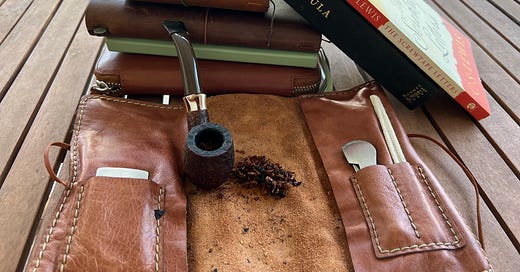I’m hoping to get back into a rhythm of writing new content for this substack soon, but in the meantime, here’s an article I wrote originally for my diocesan magazine, Inland Catholic. I share it with you now with their permission. This was originally written over the summer.
The sun is shining, a gentle breeze is blowing, and the blossoms of my cherry tree are strewn about my yard like hundreds of little red and white gems. I’m sitting on my patio with a pipe in one hand and a pen in the other. Whenever I think of true leisure, this moment right now, and all the ones that have come before it are what I think of.
But what is leisure? For some the word may conjure up visions of sweatsuits and binge-watching Netflix. For others it meay mean lounging on the couch and “doom scrolling”. For others still, it may mean those blessed few moments where housework and jobs are done for the day leaving you free to sit and do absolutely nothing. I don’t think any of these things are inherently bad, but I would not say they are leisurely activities.
For Catholic philosopher, Josef Pieper, leisure is more than the cessation of work or mere idelness. Nor is it simply what we do when we cease working. For Pieper, leisure is the very purpose and source of culture itself. The whole point of having a culture is to have true leisure. We do not break from work in order to be better workers. We break from work because that break, which we call leisure, is a higher calling than work itself. Leisure is like the liberal arts, it is done for its own sake. It is useless in the best and truest sense of the word. Leisure done with some kind of utility in mind is not true leisure. This is not to say we will not find it beneficial, but that utility is not our main goal.
Let me see if I can explain by returning to my pipe and pen. When I choose to sit down with a pipe, I have to make several preparations. I have to ensure that the weather will permit me to sit outside, that is not too hot or cold or wet or windy, for I do not smoke out of compulsion, but for pleasure. Then I must gather the necessary tools. I select a pipe from my limited collection, choose a tobacco, make sure my lighter is filled or that I have plenty of matches, and grab all the other accoutrement necessary. This usually includes a book or two, a notebook and one of my fountain pens. Sometimes a nice scotch or a good beer makes a wonderful accompaniment.
Packing the pipe is an almost liturgical process. Care is needed, deliberation. It cannot be done haphazardly, though it can become unconscious or second nature. Even smoking the pipe requires a kind of loving attention. Smoke too fast and the bole will burn too hot (possibly even break) and the tobacco will all turn to ash almost instantly. Go too slow, and you will be constantly re-lighting your pipe. The point is, you’re setting yourself up for at least a couple of hours of pleasure, not simply a quick hit of nicotine.
And that is the point. I smoke for the sheer pleasure of it and because the space it provides to sit and be disengaged from work. This is where the pen or the book come in handy.
From the pen flows words, poems half-realized, terrible little sketches, or essays like this one. This is the leisure my pipe has opened up for me, a moment removed from the hurlyburly of everyday life. Of course, I do not need the pipe or the pen. I could just here and think. But I find this difficult. The siren song of my phone or the air conditioning can be too difficult to ignore without the aid of the pipe and pen. Pieper talks about how churches or temples are spaces set aside for the holy (the highest form of leisure). My pipe does something similar. It becomes a miniature thurible to incense the space I have set aside for a lower, but still good, kind of leisure.
As we head into summer, find the time and space for leisure, find the time to thank God for the gift of “space” of reality itself by enjoying some of it and contemplating the great goodness of the God who gave us pleasures such as leaf and flame. For myself, I will attempt to follow the dying words of Theoden to Merry, to live now in blessedness and when I sit in peace with my pipe to think of Him.





